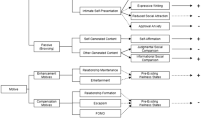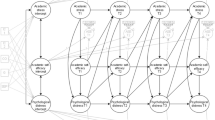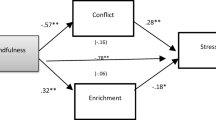Abstract
Social support and coping are reliably associated with wellbeing during adolescence, but it is unclear whether relationships between these constructs and affect are inter-related or independent. Emotional intelligence (EI) also correlates with greater wellbeing, but the key processes supporting the association are likewise uncertain. This study aimed to compare support and coping as predictors of wellbeing and stress using structural equation modeling to test alternate latent factor models. It also aimed to test how EI, measured as an ability, might influence the constructs. Data were collected from 203 Israeli high-school students. Modeling suggested that social support was a stronger influence than coping style on wellbeing, although avoidance coping made a unique contribution to lower wellbeing. EI was associated with social support, but not coping or outcome. It is concluded that social support is critical for wellbeing, over and above coping, consistent with theoretical perspectives that emphasize the importance of social engagement in adolescence. Ability EI appears to have only a modest influence on emotional functioning during adolescence.


Similar content being viewed by others
References
Aldwin, C. M., Skinner, E. A., Zimmer-Gembeck, M. J., & Taylor, A. L. (2011). Coping and self-regulation across the life span. In K. L. Fingerman, C. A. Berg, J. Smith, & T. C. Antonucci (Eds.), Handbook of life-span development (pp. 561–587). New York: Springer.
Barker, G. (2007). Adolescents, social support and help-seeking behaviour. Geneva: World Health Organisation.
Bentler, P. M. (2008). EQS 6 structural equations program manual. Encino, CA: Multivariate Software.
Bijstra, J. O., & Jackson, S. (1998). Social skills training with early adolescents: Effects on social skills, well-being, self-esteem and coping. European Journal of Psychology of Education, 13, 569–583.
Boomsma, A. (1985). Nonconvergence, improper solutions, and starting values in LISREL maximum likelihood estimation. Psychometrika, 50, 229–242.
Bowen, K. (2014). The stress-buffering effects of functional social support on ambulatory blood pressure. Health Psychology, 33, 1440–1443.
Brackett, M. A., Rivers, S. E., Shiffman, S., Lerner, N., & Salovey, P. (2006). Relating emotional abilities to social functioning: A comparison of self-report and performance measures of emotional intelligence. Journal of Personality and Social Psychology, 91, 780–795.
Bradburn, N. M. (1969). The structure of psychological well-being. Chicago: Aldine.
Buss, A. H. (1989). Personality as traits. American Psychologist, 44, 1378–1388.
Cahan, S. (1998). Intelligence scale for children. Revised Manual. Hebrew version of Wechsler’s 1974 version. Jerusalem: Psychoeducational Services and H. Szold Institute.
Carver, C. S., & Connor-Smith, J. (2010). Personality and coping. Annual Review of Psychology, 61, 679–704.
Carver, C. S., Scheier, M. F., & Weintraub, J. K. (1989). Assessing coping strategies: A theoretically- based approach. Journal of Personality and Social Psychology, 56, 267–283.
Chu, P. S., Saucier, D. A., & Hafner, E. (2010). Meta-analysis of the relationships between social support and well-being in children and adolescents. Journal of Social and Clinical Psychology, 29, 624–645.
Cicognani, E. (2011). Coping strategies with minor stressors in adolescence: Relationships with social support, self-efficacy, and psychological well-being. Journal of Applied Social Psychology, 41, 559–578.
Clarke, A. T. (2006). Coping with interpersonal stress and psychosocial health among children and adolescents: A meta-analysis. Journal of Youth and Adolescence, 35, 10–23.
Cohen, S. (2004). Social relationships and health. American Psychologist, 59, 676–684.
Cohen, S., Mermelstein, R., Karack, T., & Hoberman, H. M. (1985). Measuring the functional components of social support. In I. Sarason & B. Sarason (Eds.), Social support: Theory, research, and applications (pp. 73–94). Boston: Martinus Nijhooff.
Compas, B. E., Connor-Smith, J. K., Saltzman, H., Thomsen, A. H., & Wadsworth, M. E. (2001). Coping with stress during childhood and adolescence: problems, progress, and potential in theory and research. Psychological Bulletin, 127, 87–127.
Compton, W. C., & Hoffman, E. (2012). Positive psychology: The science of happiness and flourishing. Davis, CA: Cengage.
Cook, S. W., & Heppner, P. P. (1997). A psychometric study of three coping measures. Educational and Psychological Measurement, 57, 906–923.
Davis, S. K., & Humphrey, N. (2012). The influence of emotional intelligence (EI) on coping and mental health in adolescence: Divergent roles for trait and ability EI. Journal of Adolescence, 35, 1369–1379.
Demaray, M. K., Ruffalo, S. L., Carlson, J., Busse, B. T., Olson, A. E., McManus, S. M., & Leventhai, A. (1995). Social skills assessment: A comparative evaluation of six published rating scales. School Psychology Review, 24, 648–671.
Diener, E., Emmons, R. A., Larsen, R. J., & Griffin, S. (1985). The satisfaction with life scale. Journal of Personality Assessment, 49, 71–75.
Endler, N. S., & Parker, J. D. (1994). Assessment of multidimensional coping: Task, emotion, and avoidance strategies. Psychological Assessment, 6, 50–60.
Epstein, S. (1998). Constructive thinking: The key to emotional intelligence. Portsmouth, NH: Greenwood Publishing Group.
Erikson, E. H. (1968). Identity: Youth and crisis. New York: Norton.
Folkman, S., & Moskowitz, J. T. (2004). Coping: Pitfalls and promise. Annual Review of Psychology, 55, 745–774.
Frederickson, N., Simmonds, E., Evans, L., & Soulsby, C. (2007). Assessing the social and affective outcomes of inclusion. British Journal of Special Education, 34, 105–115.
Gallagher, E. N., & Vella-Brodrick, D. A. (2008). Social support and emotional intelligence as predictors of subjective well-being. Personality and Individual Differences, 44, 1551–1561.
Gardner, H. (2006). Multiple intelligences: New horizons. New York: Basic Books.
Gibbons, C., Dempster, M., & Moutray, M. (2011). Stress, coping and satisfaction in nursing students. Journal of Advanced Nursing, 67, 621–632.
Grant, K. E., Compas, B. E., Thurm, A. E., McMahon, S. D., Gipson, P. Y., Campbell, A. J., et al. (2006). Stressors and child and adolescent psychopathology: Evidence of moderating and mediating effects. Clinical Psychology Review, 26, 257–283.
Gresham, F., & Elliot, S. N. (1990). Social skills rating systems (SSRS). Circle Pine, MN: American Guidance Services.
Griffith, M. A., Dubow, E. F., & Ippolito, M. F. (2000). Developmental and cross-situational differences in adolescents’ coping strategies. Journal of Youth and Adolescence, 29, 183–204.
Hampel, P. (2007). Coping among Austrian children and adolescents. Journal of Adolescence, 30, 885–890.
Helliwell, J. F., & Putnam, R. D. (2004). The social context of well-being. Philosophical Transactions-Royal Society of London Series B Biological Sciences, 359, 1435–1446.
Helmes, E., Goffin, R. D., & Chrisjohn, R. D. (2010). Confirmatory analysis of the Bradburn Affect Balance Scale and its relationship with morale in older Canadian adults. Canadian Journal on Aging, 29, 259–266.
Huebner, E. S. (2004). Research on assessment of life satisfaction of children and adolescents. Social Indicators Research, 66, 3–33.
In’Nami, Y., & Koizumi, R. (2013). Structural equation modeling in educational research. In M. S. Khine (Ed.), Application of structural equation modeling in educational research and practice (pp. 23–51). Rotterdam: Sense Publishers.
Kong, F., Zhao, J., & You, X. (2012a). Social support mediates the impact of emotional intelligence on mental distress and life satisfaction in Chinese young adults. Personality and Individual Differences, 53, 513–517.
Kong, F., Zhao, J., & You, X. (2012b). Emotional intelligence and life satisfaction in Chinese university students: The mediating role of self-esteem and social support. Personality and Individual Differences, 53, 1039–1043.
Lakey, B. (2013). Perceived social support and happiness: The role of personality and relational processes. In S. A. David, I. Boniwell, & A. C. Ayers (Eds.), The Oxford handbook of happiness (pp. 847–859). New York: Oxford University Press.
Lakey, B., & Cohen, S. (2000). Social support theory and measurement. In S. Cohen, L. G. Underwood, G. Lynn, & B. H. Gottlieb (Eds.), Social support measurement and intervention: A guide for health and social scientists (pp. 29–52). New York: Oxford University Press.
Lazarus, R. S. (1999). Stress and emotion: A new synthesis. New York: Springer.
Litman, J. A. (2006). The COPE inventory: Dimensionality and relationships with approach-and avoidance-motives and positive and negative traits. Personality and Individual Differences, 41, 273–284.
Loehlin, J. C. (1998). Latent variable models: An introduction to factor, path, and structural analysis (3rd ed.). Mahwah, NJ: Lawrence Erlbaum.
Lopes, P. N., Brackett, M. A., Nezlek, J. B., Schütz, A., Sellin, I., & Salovey, P. (2004). Emotional intelligence and social interaction. Personality and Social Psychology Bulletin, 30, 1018–1034.
Lyne, K., & Roger, D. (2000). A psychometric re-assessment of the COPE questionnaire. Personality and Individual Differences, 29, 321–335.
Lyubomirsky, S., Sousa, L., & Dickerhoof, R. (2006). The costs and benefits of writing, talking, and thinking about life’s triumphs and defeats. Journal of Personality and Social Psychology, 90, 692–708.
MacCann, C., Fogarty, G. J., Zeidner, M., & Roberts, R. D. (2011). Coping mediates the relationship between emotional intelligence (EI) and academic achievement. Contemporary Educational Psychology, 36, 60–70.
MacCann, C., Roberts, R. D., Matthews, G., & Zeidner, M. (2004). Consensus scoring and empirical option weighting of performance-based Emotional Intelligence (El) tests. Personality and Individual Differences, 36, 645–662.
Martins, A., Ramalho, N., & Morin, E. (2010). A comprehensive meta-analysis of the relationship between emotional intelligence and health. Personality and Individual Differences, 49, 554–564.
Matthews, G., Deary, I. J., & Whiteman, M. C. (2009). Personality traits (3rd ed.). Cambridge: Cambridge University Press.
Matthews, G., Emo, A. K., Funke, G., Zeidner, M., Roberts, R. D., Costa, P. T, Jr, & Schulze, R. (2006). Emotional intelligence, personality, and task-induced stress. Journal of Experimental Psychology: Applied, 12, 96–107.
Matthews, G., Zeidner, M., & Roberts, R. D. (2002). Emotional intelligence: Science or myth?. Cambridge, MA: MIT Press.
Mayer, J. D., Caruso, D., & Salovey, P. (2002). MSCEIT, item booklet, version 2.0. Toronto: Multi-Health Systems.
Mayer, J. D., Salovey, P., & Caruso, D. R. (2012). The validity of the MSCEIT: Additional analyses and evidence. Emotion Review, 4, 403–408.
Mayer, J. D., Salovey, P., Caruso, D. R., & Sitarenios, G. (2003). Measuring emotional intelligence with the MSCEIT V2.0. Emotion, 3, 97–105.
Newman, D. A., Joseph, D. L., & MacCann, C. (2010). Emotional intelligence and job performance: The importance of emotion regulation and emotional labor context. Industrial and Organizational Psychology, 3, 159–164.
Offer, D., & Schonert-Reichl, K. A. (1992). Debunking the myths of adolescence: Findings from recent research. Journal of the American Academy of Child and Adolescent Psychiatry, 31, 1003–1014.
Pavot, W., & Diener, E. (2013). Happiness experienced: The science of subjective well-being. In S. A. David, I. Boniwell, & A. C. Ayers (Eds.), The Oxford handbook of happiness (pp. 134–151). New York: Oxford University Press.
Perera, H. N., & DiGiacomo, M. (2015). The role of trait emotional intelligence in academic performance during the university transition: An integrative model of mediation via social support, coping, and adjustment. Personality and Individual Differences, 83, 208–213.
Peters, C., Kranzler, J. H., & Rossen, E. (2009). Validity of the Mayer–Salovey–Caruso emotional intelligence test: Youth version—research edition. Canadian Journal of School Psychology, 24, 76–81.
Pierce, G. R., Sarason, I. G., & Sarason, B. R. (1996). Coping and social support. In M. Zeidner & N. S. Endler (Eds.), Handbook of coping (pp. 434–451). New York: Wiley.
Qualter, P., Gardner, K. J., Pope, D. J., Hutchinson, J. M., & Whiteley, H. E. (2012). Ability emotional intelligence, trait emotional intelligence, and academic success in British secondary schools: A 5 year longitudinal study. Learning and Individual Differences, 22, 83–91.
Rivers, S. E., Brackett, M. A., Salovey, P., & Mayer, J. D. (2007). Measuring emotional intelligence as a set of mental abilities. In G. Matthews, M. Zeidner, & R. D. Roberts (Eds.), The science of emotional intelligence: Knowns and unknowns (pp. 230–257). New York: Oxford University Press.
Ruiz-Aranda, D., Extremera, N., & Pineda-Galán, C. (2014). Emotional intelligence, life satisfaction and subjective happiness in female student health professionals: The mediating effect of perceived stress. Journal of Psychiatric and Mental Health Nursing, 21, 106–113.
Saha, R., Huebner, E. S., Hills, K. J., Malone, P. S., & Valois, R. F. (2014). Social coping and life satisfaction in adolescents. Social Indicators Research, 115, 241–252.
Salovey, P., Bedell, B. T., Detweiler, J. B., & Mayer, J. D. (1999). Coping intelligently: Emotional intelligence and the coping process. In C. R. Snyder (Ed.), Coping: The psychology of what works (pp. 141–164). New York: Oxford University Press.
Salovey, P., Woolery, A., & Mayer, J. D. (2001). Emotional intelligence: Conceptualization and measurement. In G. Fletcher & M. S. Clark (Eds.), The Blackwell handbook of social psychology (Vol. 2: interpersonal processes). Oxford: Blackwell Publishers.
Sarason, I. G. (1983). Assessing social-support questionnaire. Journal of Personality and Social Psychology, 44, 127–139.
Satorra, A., & Bentler, P. M. (2001). A scaled difference Chi square test statistic for moment structure analysis. Psychometrika, 66, 507–514.
Schiffrin, H. H., & Nelson, S. K. (2010). Stressed and happy? Investigating the relationship between happiness and perceived stress. Journal of Happiness Studies, 11, 33–39.
Schneider, T. R., Lyons, J. B., & Khazon, S. (2013). Emotional intelligence and resilience. Personality and Individual Differences, 55, 909–914.
Seiffge-Krenke, I. (2013). Stress, coping, and relationships in adolescence. New York: Psychology Press.
Skinner, E. A., Edge, K., Altman, J., & Sherwood, H. (2003). Searching for the structure of coping: a review and critique of category systems for classifying ways of coping. Psychological Bulletin, 129, 216–269.
Suldo, S. M., Shaunessy, E., & Hardesty, R. (2008). Relationships among stress, coping, and mental health in high-achieving high school students. Psychology in the Schools, 45, 273–290.
Taylor, S. (2011). Social support: A review. In H. Friedman (Ed.), Oxford handbook of health psychology (pp. 189–214). New York: Oxford University Press.
Trinidad, D. R., & Johnson, C. A. (2002). The association between emotional intelligence and early adolescent tobacco and alcohol use. Personality and Individual Differences, 32, 95–105.
Veenhoven, R. (2015). Informed pursuit of happiness: What we should know, do know and can get to know. Journal of Happiness Studies, 16, 1035–1071.
Watson, D. (2000). Mood and temperament. New York: Guilford Press.
Weston, R., & Gore, P. A. (2006). A brief guide to structural equation modeling. The Counseling Psychologist, 34, 719–751.
Wolf, E. J., Harrington, K. M., Clark, S. L., & Miller, M. W. (2013). Sample size requirements for structural equation models an evaluation of power, bias, and solution propriety. Educational and Psychological Measurement, 73, 913–934.
Wong, P. T., Wong, L. C., & Scott, C. (2006). Beyond stress and coping: The positive psychology of transformation. In P. T. Wong & L. C. Wong (Eds.), Handbook of multicultural perspectives on stress and coping (pp. 1–26). New York: Springer.
Yuan, K.-H., & Bentler, P. M. (2007). Robust procedures in structural equation modeling. In S.-Y. Lee (Ed.), Handbook of latent variable and related models (pp. 367–397). Amsterdam: Elsevier/North-Holland.
Zeidner, M., Hadar, D., Matthews, G., & Roberts, R. (2013a). Personal factors related to compassion fatigue in health professionals. Anxiety, Stress, & Coping: An International Journal, 26, 595–609.
Zeidner, M., & Hammer, A. (1992). Coping with missile attack: Resources, strategies, and outcomes. Journal of Personality, 60, 709–746.
Zeidner, M., Kloda, I., & Matthews, G. (2013b). Does dyadic coping mediate the relationship between emotional intelligence (EI) and marital quality? Journal of Family Psychology, 27, 795–805.
Zeidner, M., Matthews, G., & Roberts, R. (2009). What we know about emotional intelligence: How it affects learning, work, relationships, and our mental health. Cambridge, MA: MIT Press.
Zeidner, M., Matthews, G., & Roberts, R. D. (2012). The emotional intelligence, health, and well-being nexus: What have we learned and what have we missed? Applied Psychology: Health and Well-being, 4, 1–30.
Zeidner, M., & Saklofske, D. (1996). Adaptive and maladaptive coping. In M. Zeidner & N. Endler (Eds.), Handbook of coping: Theory, research, applications (pp. 505–531). New York: Wiley.
Zeidner, M., Shani-Zivotich, I., Matthews, G., & Roberts, R. (2005). Assessing emotional intelligence in gifted and non-gifted high school students: Outcomes depend on the measure. Intelligence, 33, 369–391.
Zimmer-Gembeck, M. J., & Skinner, E. A. (2011). The development of coping across childhood and adolescence: An integrative review and critique of research. International Journal of Behavioral Development, 35, 1–17.
Author information
Authors and Affiliations
Corresponding author
Rights and permissions
About this article
Cite this article
Zeidner, M., Matthews, G. & Shemesh, D.O. Cognitive-Social Sources of Wellbeing: Differentiating the Roles of Coping Style, Social Support and Emotional Intelligence. J Happiness Stud 17, 2481–2501 (2016). https://doi.org/10.1007/s10902-015-9703-z
Published:
Issue Date:
DOI: https://doi.org/10.1007/s10902-015-9703-z




